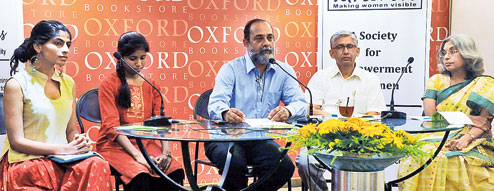 |
| Shreya Ila Anasuya, Keya Dutta, Aniruddha Deb, Partha Das and Kaveri Dutta at the event. Picture by Anindya Shankar Ray |
Such issues and more were discussed at a highly interactive discussion, Pushing Boundaries — Girls and the Right to Mobility, organised by Parichiti and Child Rights and You (CRY) at Oxford Bookstore on May 31. The panellists included archietect Partha Das, principal of Modern High School for Girls Kaveri Dutt, activist Shreya Ila Anasuya and a student Keya Dutta. The moderator was psychiatrist Aniruddha Deb.
The discussion began on the premise that many girls drop out of school after primary education as their parents are not ready to let them travel long distances alone.
“There has been a growing concern about the rising atrocities against women. A lot of tears have been shed. But at the end, we have remained in the same boat. Action is not difficult if we have clear thoughts preceding them,” said Deb at the start.
Archietect and urban designer Das said that judicious urban planning makes an area safe. He claimed that the newer areas lack the para feeling of its older counterparts. They are usually unsafe too. “Vendors make streets safer. It’s time to be vocal about the loopholes of planning,” he said.
Fifteen-year-old Keya has secured a first division in Madhyamik this year. “The area I come from (Panchasayar, behind Peerless Hospital), most girls opt out of school after Class VII or VIII. I would like to continue my education but if I have to travel alone, then maybe my parents would want me to discontinue too on safety grounds,” she said.
Anasuya, the founder member of the group Take Back The Night in India, said safety was in numbers. “We have founded the group so that we can meet at a so-called unsafe time and make our presence felt on the streets.We must also recognise the vulnerability of the homosexuals,” she said. Anasuya felt that safety was also a trap at times. It is a girl’s choice if she wants to learn karate . Safety issues should not force her to act in a certain manner.
Dutta wrapped up the discussion by enumerating the role of educationists and how her school tries to empower students. “There are always different rules for boys and girls. We must try to change that mindset,” she said.
The floor was opened to a most power-packed interactive session with a diverse audience exchanging viewpoints, outrage and experinces.










